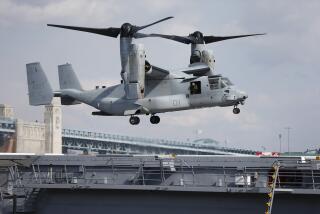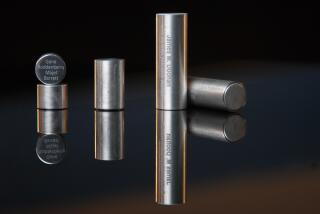Reagan Names 12 for Shuttle Probe : Independent Panel to Oversee NASA Inquiry to Determine Cause of Blast
- Share via
WASHINGTON — President Reagan, concerned that a NASA investigation of the explosion of the space shuttle Challenger might be seen as a whitewash, Monday named an independent blue-ribbon commission headed by former Secretary of State William P. Rogers to oversee the probe of the disaster’s cause.
Neil A. Armstrong, the first man to walk on the moon, will be vice chairman of the 12-member panel, which also includes retired Air Force Brig. Gen. Charles (Chuck) Yeager, the first man to break the sound barrier, and Sally K. Ride, the first American woman in space, as well as academics and businessmen.
“It’s time now to assemble a group of distinguished Americans to take a hard look at the accident, to make a calm and deliberate assessment of the facts and ways to avoid repetition,” Reagan said in a brief White House ceremony.
‘Can Go Anywhere’
“They can go anywhere to find the facts dealing with this tragedy,” added White House spokesman Larry Speakes. “Their charge is to find out what happened, why it happened, and to fix it.”
He said a NASA interim panel, established immediately after Tuesday’s explosion, will “cease to exist.” But NASA officials said the internal group will continue to sift through evidence for presentation to the presidential commission.
The President is further expected to reaffirm his commitment for manned exploration of space in tonight’s State of the Union address, which was postponed a week because of the shuttle tragedy last Tuesday.
And on Wednesday, Reagan will back up his call for renewed space exploration by proposing a $7.69-billion budget for the National Aeronautics and Space Administration in fiscal 1987--almost $360 million more than the agency will spend this year. Congressional sources said the increased spending request appears in the fiscal 1987 budget proposal that the President will send to Congress.
If approved, the Reagan proposal would increase space program spending at a time when the new Gramm-Rudman balanced-budget law is forcing sizable cuts elsewhere. Congress had allotted $7.66 billion for NASA in fiscal 1986, but the 4.3% cuts in 1986 federal programs required under Gramm-Rudman will reduce this year’s space budget to $7.33 billion.
The shuttle explosion also has generated new support for NASA on Capitol Hill as well.
Seeks Replacement
Rep. Robert G. Torricelli (D-N.J.), member of a House subcommittee on space, introduced legislation Monday that would allot $400 million for a replacement for the Challenger. An aide called the money a down payment on the cost of the orbiter, which would take four to six years to complete.
Speakes said the President retains full faith in NASA despite his appointment of an outside commission. The President chose to have an independent commission head the investigation because it would have “no ax to grind either way,” Speakes said.
Speakes also asked reporters to “think what type of questions” they would ask “if NASA had appointed the permanent and only board” to look into the accident.
The commission will have full access to all NASA data as well as information from other agencies and suppliers, both inside and outside of government. It does not have subpoena power, but Speakes said Reagan is prepared to grant such legal authority if it is needed.
According to the executive order creating the commission, its report, due within 120 days, should establish the probable cause or causes of the Challenger accident and include “recommendations for corrective or other actions.”
In a briefing for reporters, commission Chairman Rogers stressed that the investigation is “not adversarial as far as NASA is concerned.”
Acting NASA Administrator William R. Graham, who appeared with Rogers, said the President had asked him to work closely with commission members and that he expects to do so.
Sees No Difficulty
Rogers said he will convene his group as soon as possible and that he does not anticipate any difficulty “getting all the information we want.”
Reagan said he decided to appoint the commission Friday on the flight home from Houston, where he attended a memorial service for the seven Challenger crew members.
Over the weekend, White House aides began to contact prospective members. The panel’s membership could grow to a maximum of 20 under the executive order signed by Reagan.
When asked to identify some of the problems the commission would face, Vice Chairman Armstrong said: “The biggest difficulty is not to jump to conclusions.”
Preliminary studies by NASA indicate that the blame for the crash may be traced to a possible fault in the steel casing of one of the shuttle’s solid rocket boosters.
Times Staff Writer Michael Wines also contributed to this report.
More to Read
Sign up for Essential California
The most important California stories and recommendations in your inbox every morning.
You may occasionally receive promotional content from the Los Angeles Times.













